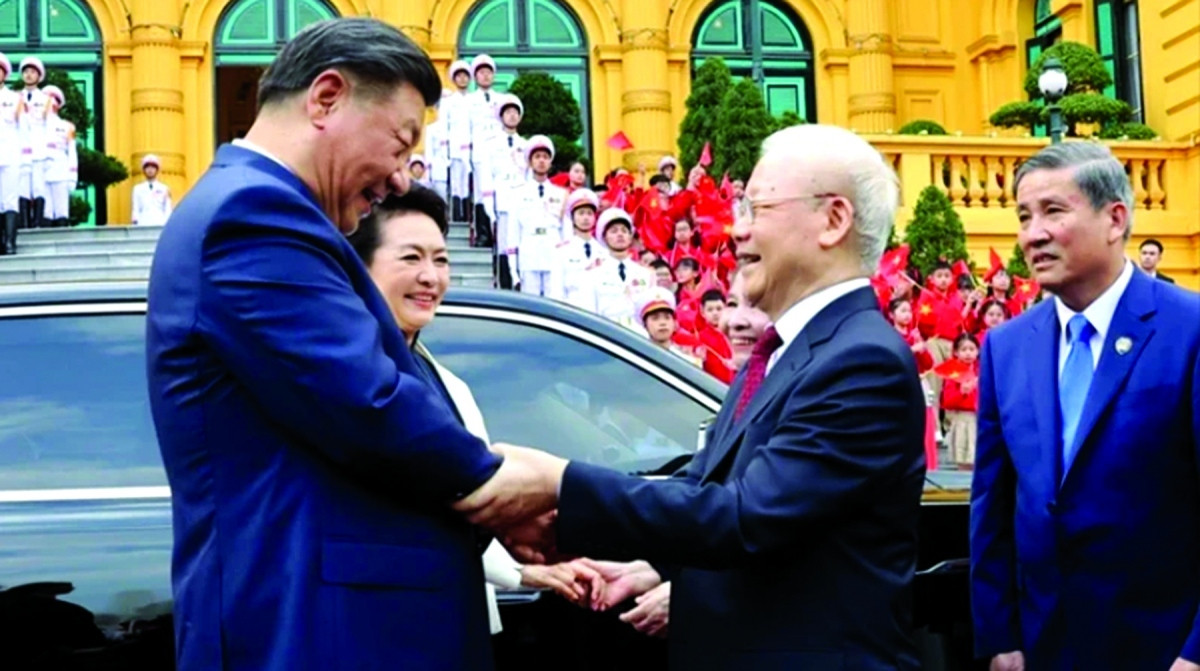

Since the 29th Diplomatic Conference in 2016, Vietnam’s “Bamboo Diplomacy” has become a popular concept which truly bears the identity of the bamboo tree, particularly as it remains flexible, steadfast, resilient, and determined to weather any storm and to grow well.
The ultimate goal of diplomacy and foreign affairs is to ensure the highest level of national interests, following late President Ho Chi Minh’s teachings of “to do whatever in the interest of the nation.”
Vietnam therefore strives to promote peace, friendship, cooperation, development, equality, respect for each other’s sovereignty, legitimate rights and interests, while also resolving disagreements in the spirit of friendship and in accordance with UN Charter and international law. It also opposes all acts of bullying, power politics, blockades, and unilateral embargoes, as well as the use and threat of force in international relations. These can be viewed as immutable principles in international relations.
Vietnam strictly complies with and also requires other states to strictly follow the UN Charter and the 1982 UN Convention on the Law of the Sea (UNCLOS) when it comes to the East Sea issue. It opposes all unilateral acts of violating the country’s sovereignty and sovereign rights and welcomes efforts to contribute to maintaining peace and stability in regional waters. Its highest goal is to protect and maintain sovereignty and territorial integrity, but also to avoid confrontation and armed conflict to ensure a peaceful and stable environment for national development.
In the ongoing conflict between Russia and Ukraine, Vietnam always emphasizes compliance with the UN Charter and calls on all parties to return to negotiations. Vietnamese leaders have made it clear that Vietnam does not take sides, but instead chooses justice and righteousness. The country strongly condemns violent attacks against civilians in the conflict between Israel and Hamas in the Middle East.
Proving effectiveness in reality
In 2023, Vietnam made historic progress in relations with traditional friends; neighbouring countries; and major partners, including Laos, Cambodia, Indonesia, Thailand, Singapore, Mongolia, the Republic of Korea, Japan, Cuba, China, Russia, the United States, and Australia.
The country has brought into full play the efficiency of bamboo diplomacy by displaying skillful behaviour, creating a strategic balance and resolving dilemmas in relations with major countries, as well as in flexibly responding to external pressures. It has competently handled its position in relations between Russia and the US; between the US and China; as well as in the tripartite relations between Russia, Vietnam, and the US; and between the US, China, and Vietnam.
Last year saw Vietnam welcome leaders of all three world powers - Russia, the US, and China - on their working visits to Vietnam. Notably, during a State visit to Hanoi in September by President Joe Biden, both Vietnam and the US agreed to lift their ties to a comprehensive strategic partnership. Similarly, during a State visit to Hanoi made in December by Party General Secretary and President Xi Jinping, both sides agreed to further deepen the comprehensive strategic cooperative partnership and build a China-Vietnam community with a shared future.
Furthermore, the country’s ties with Japan also entered into a new era of development as both countries agreed to upgrade relations to a comprehensive strategic partnership during President Vo Van Thuong’s visit to Tokyo in November.
So far, Vietnam has established strategic partnerships or comprehensive strategic partnerships with all five countries that are permanent members of the UN Security Council. It has also moved to increase the total number of strategic partners to 18, including six comprehensive strategic partners.
Economic diplomacy has also proved to be effective in national economic development, bringing about a record of US$36.6 billion in foreign direct investment (FDI) last year. Thanks to enhanced economic diplomacy, the country has taken advantage of opportunities from free trade agreements, thereby helping it to secure US$683 billion in foreign trade despite global market complications.
According to Prime Minister Pham Minh Chinh, the diplomatic sector contributes to presenting new opportunities for national development; enhancing the country’s role, position, and prestige in the international arena; and creating solid conditions for bamboo diplomacy to anticipate and deal with challenges ahead in the year ahead.
Standing firm against global headwinds in 2024
There might be dramatic changes occurring in the global political and economic landscape in the year ahead as a number of major elections are due to take place in Indonesia, India, Russia, the UK, the European parliament, and elsewhere. Perhaps most eyes will be on the presidential election in the US however, especially as it is the world’s most powerful country politically and economically. The US, Europe, and the rest of the world are preparing their own scenarios if former president Donald Trump wins this November’s election.
Amid such circumstances, Vietnam’s bamboo diplomacy, after nearly 40 years of implementing the Renovation process, has proved to be effective It operates in the spirit of independence and self-reliance, diversification, and multilateralisation of international relations, while also proactively itself integrating into the world. The country is a friend, a trusted partner, and an active and responsible member of the international community.
Vietnam has so far established and expanded diplomatic relations with 193 countries and territories worldwide, of which 18 are strategic partners or comprehensive strategic partners, including five permanent members of the UN Security Council. It is a member of many multilateral free trade agreements and mechanisms. The country has therefore constituted a network of interwoven, multi-layered, and associated interests, helping it to firmly respond to global challenges and headwinds if any occurs in 2024.
It is firmly believed that the diplomatic sector, under the leadership of the Communist Party of Vietnam, will continue to play a pioneering role in enhancing the country’s international position and reputation, as well as attracting external resources to national development which will ultimately contribute to realising the Resolution of the 13th National Party Congress.
Source: VOV